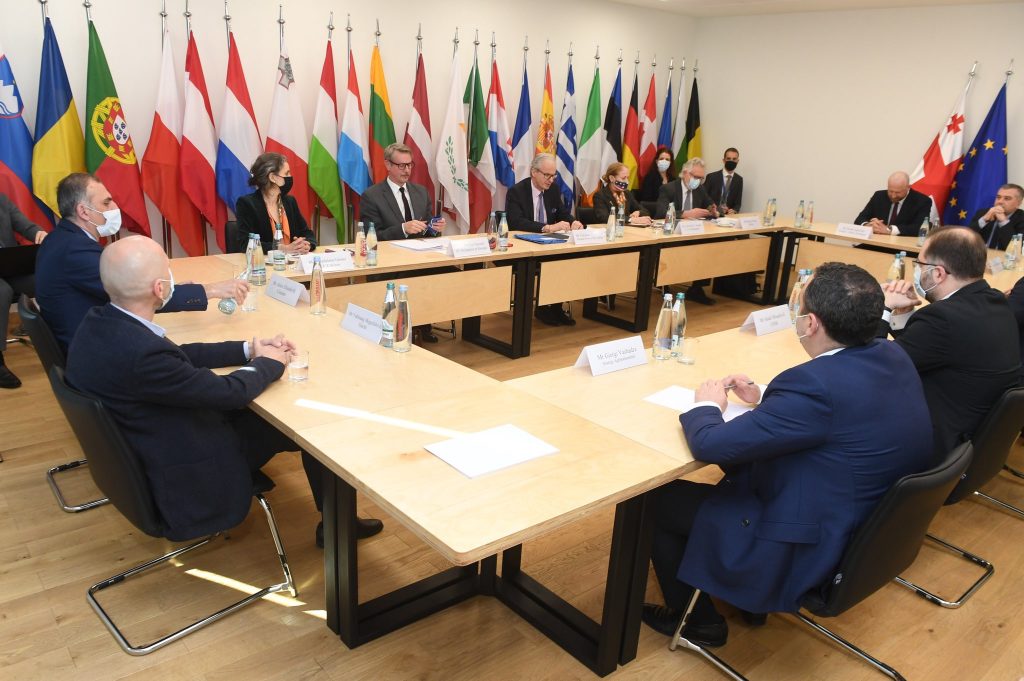In their remarks after eight-hour long EU mediation talks, that did not yield a solution to Georgia’s ongoing political impasse, the ruling Georgian Dream party and opposition leaders pinned the blame on each other for failing to strike a deal.
The accusations came as the parties failed to sign the solution document put forward by Christian Danielsson, European Council President Charles Michel’s personal envoy to mediate Georgia’s crisis. Danielsson said after the meeting, in the early minutes of March 31, that he was “sad to report that none of the political parties could agree to this solution in whole.”
Irakli Kobakhidze, the ruling party chairperson said that derailing the agreement was an end in itself for the “radical opposition,” and its “real leader,” former President Mikheil Saakashvili. MP Kobakhidze claimed GD expressed willingness to conduct ambitious electoral and judicial reform, ensure power-sharing in parliament, and initiate an amnesty law regarding June 2019 protests, dropping charges against UNM Chair Nika Melia.
“In exchange for all of this, the opposition had to fulfill a single promise – it should have rejected its sabotage of state institutions and entered Parliament,” the Georgian Dream chairperson said, adding that the ruling party still vows to implement the amendments regarding electoral and judicial reform even without the agreement.
Salome Samadashvili of the United National Movement, the largest opposition party, noted that all members of the opposition agreed over points on electoral and judicial reform, and parliamentary power-sharing, though could not reach compromise with GD over snap elections and release of “political prisoners.” Samadashvili said that the opposition would have agreed to an amnesty law should it have envisaged releasing opposition-leaning Mtavari Arkhi TV shareholder Giorgi Rurua along with Nika Melia, UNM leader.
“So far, [GD founder Bidzina] Ivanishvili and his entourage have not changed their destructive position for their country,” Giga Bokeria of European Georgia remarked. Bokeria said the opposition’s goal in the coming future will be to increase international and domestic pressure on the “Ivanishvili regime.”
Strategy Agmashenebeli party leader Giorgi Vashadze said the GD government decided to keep Giorgi Rurua “hostage,” while also going back on the promise made to European Council President Charles Michel of including snap elections as part of the agreement. Apart from this, Vashadze asserted that he was willing to agree on the judicial and electoral reform and power-sharing points, despite their “superficial” nature.
“The negotiators, as before, were not able to conclude a text that would be signed by the Georgian Dream,” noted Zurab Japaridze, leader of right-libertarian Girchi – More Freedom party. Japaridze reiterated that the opposition maintained its principal positions regarding snap elections and release of alleged political prisoners. He also said although he did not believe judicial reform, electoral reform and power-sharing points would “actually change something,” he was ready to sign them.
It is now unclear whether and if yes, how the mediation talks will continue. Danielsson is expected to brief President Charles Michel about the latest developments in the coming days.
Also Read:
- Early Elections Not an Option, PM Garibashvili Says
- GD, Opposition on Mediation Ahead of EU Diplomat’s Tbilisi Return
- EU Mediation: Danielsson to Return to Georgia
This post is also available in: ქართული (Georgian) Русский (Russian)

